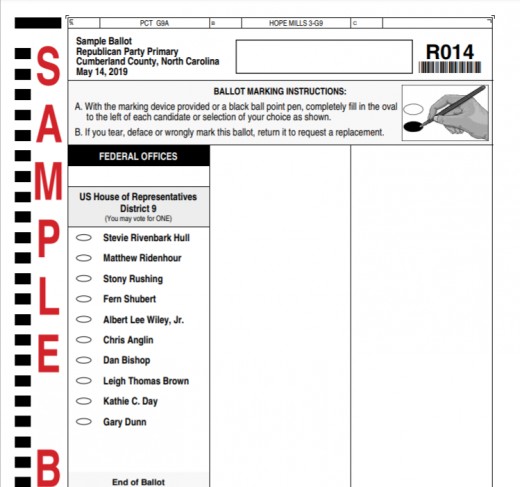EXCLUSIVE: Election Activists Discover Votes in North Carolina Can Be Traced to Individual Voters

An election transparency organization monitoring North Carolina's recent special elections has discovered that the state has been violating one of the most hallowed principle of free-world elections, the secret ballot. The activists found, and have had it confirmed by various election officials, that about half of voters in that state are given ballots which are marked with identifying numbers which correspond to identifying numbers assigned to the voters. The voters who are impacted are those who vote early or by absentee ballot. This makes it possible for any election official with access to the ballots and the voter lists to determine how these voter voted.
In presidential elections, up to 70% of voters vote early or absentee. It is possible in North Carolina to determine if these voters voted for Hillary Clinton or Donald Trump.
The discovery was made in the course of the organization's state-by-state evaluation of election systems, centering on security against hacking, and the transparency and verifiability of voting results.
The organization, Audit Elections USA, says similar violations of the secret ballot principle also take place in Texas.
The evaluation is part of a nationwide push by election transparency activists to pressure local and state election authorities to implement election systems and policies which assure transparency, verifiability, and overall security in elections, at a time when election hacking by either foreign or domestic players has become a critical concern, especially as the 2020 elections approach. Transparency activists have arrived at a general set of recommendations which they say can be easily and realistically implemented by this time which would secure America's elections.
In an email to supporters and the election integrity activist community last month, John Brakey and Susan Pynchon of Audit Elections USA reported:
"In most states, voters have a unique voter identification number. This helps the election office keep track of voters in a voter registration database and allows voters to check to see if their ballot has been counted. This process is normal and acceptable.
However, in North Carolina, they take this a step further by putting the unique voter identification number on the ballot itself, for all early voted and absentee ballots, which account for at least 50% of the ballots cast in the state. This allows elections staff and county election boards of elections to see how people have voted."
Going into the details of the North Carolina voting process, Brakey and Pynchon write:
"A voter walks into polling place and gives his or her name. The poll worker looks up the name on the electronic poll book. The voter must state additional information such as their address to ensure it is the voter. The poll worker then prints out something called a "One-stop Application," which has all the voter information on it (name, address, etc.). The voter carries the 1-stop application to another table, where the poll worker looks at the information on the application and then selects the correct ballot style for the voter. The 1-stop application is then scanned, and a unique identifying number is assigned by the computer to that application. The computer then prints out the final version with the unique identifying number on it. The poll worker takes the unique identifying number and hand writes the number on the ballot."
Brakey and Pynchon have been working to confirm that voters are being tracked on their ballots in conversations with Katelyn Love, deputy general counsel for the North Carolina Board of Elections.
Audit Elections USA has previously visited and reported on 13 states so far. The non-profit, 501c3 tax status organization says that it has found that, with few exceptions, almost all of the US's thousands of local election systems are insecure and hackable, with some almost laughably so. Audit Elections USA reserves some of its most vociferous criticism or election districts which are transitioning to the use of BMDs, or ballot marking devices, which can produce large numbers of fake paper ballots in a short period of time. Election transparency activists argue that hand-marked paper ballots are superior because they leave a uniquely verifiable paper trail, which, in conjunction with other measures which could be easily deployed across the US, would make US elections extremely difficult to hack without being discovered.
Election transparency activists and supporters have rallied behind a general set of requirements which, at a minimum, should be followed and incorporated into federal, state, and local election law into order to make US elections virtually hack-proof.
- Voter hand-marked paper ballots (with exceptions for disability,) which then are fed it into the kind of optical scan device which generates a digital image of each ballot, and then stores it in memory. These are already in use in over sixty percent of US counties. The images should be posted on the Internet or made available on a DVD for any citizen to recount. In the event that there are significant discrepancies with the official vote count, that is the signal for a court to order a hand recount of the paper ballots. At the forefront of efforts to make these images public record are citizen's groups like Audit USA, and citizen activists like Bev Harris, John Brakey, Harvey Wasserman, and Bob Fitrakis.
- Explicitly disallow any ballot-marking system but voter hand-marked paper ballots, as the standard for casting votes, with exceptions for disability. At the present moment, election departments across the country are updating or getting ready to update the last generation of voting systems, relics of the Help America Vote Act (HAVA) funding cycle. In some states, like Pennsylvania, Texas, Kansas, Ohio, Delaware, New Jersey, and New York, counties are ignoring activists' recommendations, and moving to ballot marking devices.
Of North Carolina's present system which allows anyone with the proper access to see how one voted, Audit Elections USA writes:
"In North Carolina, the County Board of Elections are political, with 3 members of the Governor’s party and two members of the opposing party on each board. Since the current Governor is a Democrat, each county board of elections is composed of 3 Democrats and 2 Republicans. The people who serve on these boards also tend to be highly political, which is why they have been selected to serve by their political party. Imagine the temptation for the members of these county boards to reveal to the local party machine how people have voted in their county."
Although a number of bills are winding through Congress which purport to accomplish election security, none do, including Tulsi Gabbard's Securing America's Elections Act 2018, H.R. 5147, and Jim Sarbanes' (D-MD) H.R. 1, For the People Act.
Audit Elections USA says it will continue to work to secure US elections right up to and throughout 2020.



